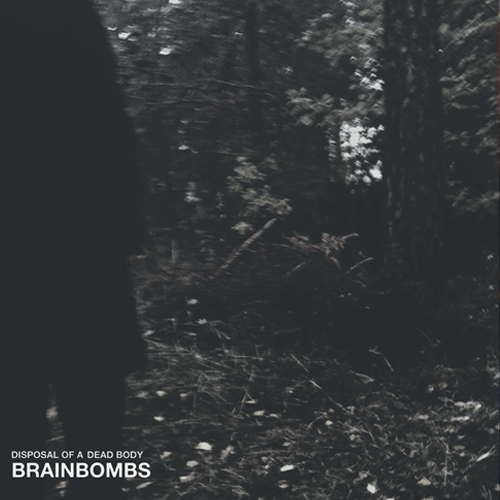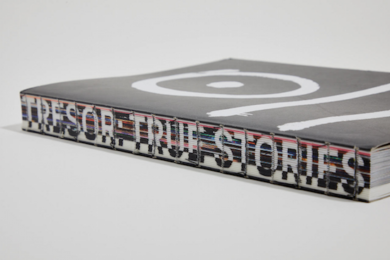Seems like it must be hard to be a transgressive and boundary-pushing creator of ugly noise in 2013. Not hard just to exist, obviously – there’s provisions for anyone to say pretty much whatever they want in the medium of music – but it’s ever more of an uphill battle to elicit the sort of pearl-clutching, sensibility-smashing woolly liberal revulsion that justifies the existence of this sort of thing in the first place. Partly, this is because noise music and its attendant culture is now older than most of the people currently involved with it. Moreover, using the same leap of logic that birthed ‘Rule 34’ (if something exists, it’s represented in pornographic form), no statement is too disgusting or stupid or offensive to not have already been made, and probably easily Googleable. If you record yourself screaming incoherent, violently misogynist abuse whilst your flatmate is out shopping, and put it over some screeching feedback, it’s gotta take a little shine off when some Kev Sixpack with a sports science degree gets in the Daily Mail for doing much the same, except to celebrity feminists on Twitter.
What does this all have to do with Brainbombs, presenting here their sixth studio album and first since 2008? Well, while their guitar-bass-drums setup is at least as much ‘rock’ as ‘noise’ in its approach, at this point they are veterans in the annals of intemperate foulness. First assembling in the mid-80s, claiming frequently banned American writer Peter Sotos as their chief inspiration, the Swedish band went on to amass a catalogue of paeans to brutal psychopathy and the men who commit it, soundtracked by slurring, dizzy and utterly meat-fisted reductions of Stoogean proto-punk, heavy metal and accidental avant-garde. They almost never performed live, and the few Brainbombs interviews out there are terse and dismissive. There’s almost nothing in their music that amounts to an ironic wink, or a layered Eminem-style disclaimer that Peter Råberg is just fuckin’ with ya. All we can ascertain is that they still, after close on thirty years, still get something out of doing this, whereas (for example) William Bennett, Nick Cave and the various Geto Boys eventually moved on.
As an album title, Disposal Of A Dead Body probably has meaning beyond its perfunctory grossout factor. While technically a studio effort, it was reputedly recorded over four years. Its 24 songs stretch to just under two hours (nearly thirty minutes per side of vinyl equals zero concession to audiophile dorks. The solution, if you hadn’t figured already, is TURN IT FUCKING UP); essentially, this release seems to be an unceremonious one-shot dump of everything they’ve recently recorded, with no info offered beyond song titles. This hasn’t led to an abandonment of quality control, although Brainbombs are helped here by almost all their songs being minor variations on a theme. A primitive riff chokes itself into life and repeats obstinately while Drajan Bryngelsson keeps a glassy-eyed, cardboardy plodbeat and Råberg drawl-preaches from his shit-spattered vantage point. Sometimes there’s a trumpet, which since the Brainbombs’ early work has prided itself on never being in tune.
And yet! From side one onwards there are curveballs on this album, of a sort. Two titles, ‘Libera Me Domine’ and ‘I.N.R.I.’, appeal to the listener’s Latin knowledge; ‘I.N.R.I.’ is a Biblical reference, not a Sarcofago cover, and has the theologically appropriate refrain, "Die, Jesus, die". On both ‘Don’t Go Near The River’ and ‘Nowhere’, the band grind to a halt leaving Råberg to holler alone, during which his accent takes on the qualities of a Mexican bandit from a bad Western. "Mary, Eleanor, Paul / Many, many more / I killed them all / Fuck you all" (‘Don’t Go…’) is probably some serial killer reference, although I doubt having the inside track in these matters markedly adds to the experience. There are also songs here called ‘Fuck You All’ and ‘Kill Them All’, which is a totally different song to Brainbombs’ other song ‘Kill Them All’. Y’know, just in case you weren’t grasping the extent of the monomania.
‘Agony’ is both an instrumental and a surprisingly conventional gnar-rock basement blowout, which could have emerged from the amps of someone like Purling Hiss. ‘The Savior’ and ‘True Master’ sees their repetition – invariably too scattershot to be the work of anything other than very flawed humans – take on an unusual machine-like quality, probably the closest Brainbombs’ clammy unease will get to that of Suicide. ‘Prepared’ wanks away with chimpish futility on the least psychedelic wah-wah guitar ever: listening, you feel less like you’re ascending through the ozone, more trapped in a cupboard at a bikers’ house party. This is reprised for ‘The Clown’ – and, as much as it might be missing the point to chide this band for being overly obvious, ‘clowns = sexual predators’ is a bit of a played-out meme, no? – which splices the wah pedal action with almost Hellhammer-like primordial soup doom riffs. ‘Woke Up This Morning’ ("…blood on my sheets / blood on my hands … thank you Jesus") feels like an attempt to take Spacemen 3’s appropriation of blues tropes and bend them back towards their original position.
Reasonably for a band who released a compilation called Genius And Brutality, Taste And Power, the persona Råberg inhabits in Brainbombs has generally been a pulpy, Nietzsche-via-Stewart-Home caricature with no signs of weakness. On Disposal…, the mask slips a little. There’s a song titled ‘I Am Sorry’, and two more called ‘Jealous’ and ‘Jealousy’, actually the same song recorded in Crampsy trashabilly and drunk’n’insensible sludge-punk versions (the latter is a good shout for an album highlight). "I loved you / Like I never loved before / But you left me / You fucking whore." How did the vocalist react? "You made me cry." He sounds genuinely incredulous that he’s been reduced to this, and suggests that the trick to successfully capturing the essence of wounded male pride is to be as low-minded as possible.
Sometimes, the highest praise you can lavish on a piece of music is to detail its ability to transport you to a foreign place; give you a taste of a life you don’t actually lead through mere recorded sound. Often, this is framed in aspirational terms – the ‘ludes and mirrorballs of New York disco, say, or less specifically, an anything-seems-possible boozy singalong with your ace mates (this is normally reserved for Oasis and the like, but that’s by the by). Listening to Brainbombs feels like hoovering all your failures, insecurities and problematic thoughts into a single dustbag of sticky lowliness, before letting it explode into the already-fetid air. It’s a tour through the inner workings of the pathetic social malcontent – tonight, thank god it’s them instead of you.
People who buy Brainbombs records, which is to say people like me, mostly want to keep this cosy distance, I suspect. Staring into the abyss of rape, murder and torture is easier with secure safety railings, y’know? It isn’t something I’d recommend devoting all your time to: the reason Brainbombs have been able to maintain this intellectual and artistic impasse for 28 frickin’ years is probably because they dip idly in and out of it. Also, there is lots of great music being made which is not ethically reprehensible, and doesn’t run the risk of making people think you’re an arsehole if they find out you like it. Disposal Of A Dead Body, all 115 minutes or so of it, is for those fleeting evenings when you’re past caring.


















